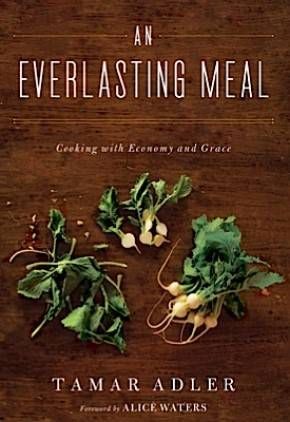
Is Tamar Adler’s AN EVERLASTING MEAL A Cookbook?
I pick up most cookbooks with the intention of cooking something within them, something from one of the pretty pictures on thick glossy stock of Thai spring rolls. Cookbooks are sensual experiences. Visually. And if you can get it together with your apron and whisk, tasty.

This is more of a manifesto. It is get-smart cooking, pantry cooking, what-to-do-with-leftovers cooking, not cooking as sugar-dusted art form. Adler wants you to salt the water “until it tastes good” and then boil things in it, and then stick those things in Mason jars, with olive oil. She wants you to cook like a person who know what to do with 3 pounds of beets.
Adler’s writing is dry, extremely smart, self-aware, Dillardesque, if Annie Dillard wrote about bread crumbs, and if it goes off on a tangent about eating walnuts in Italy, the point is that, this is just what Italians do. No big whoop. Except it is to us factory-farm-poultry-addled Americans who eat in our cars on the freeway, while texting, and would not know a walnut tree if we wrapped ourselves around it.
The chapter on beans is titled “How To Live Well.” Adler writes, “I make notes for myself after meals, and there are enough torn pieces of paper attesting that ‘the best bean broth has fennel in it!’ for it to have become axiomatic.”
“Roasted vegetables are particularly good when they have had a few days to settle into themselves,” she writes. Adler frequently personifies the vegetables and recommends putting them in a bowl, “it feels pleasantly frivolous to spend a few moments fussing cauliflower, beets, and squash into a tableau.” So I did. And it was great, as great as the first perfect asparagus; I boiled them until they submitted completely, to my olive oil.














